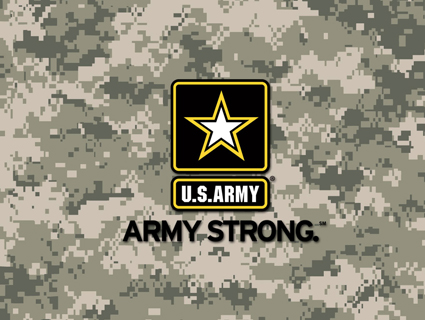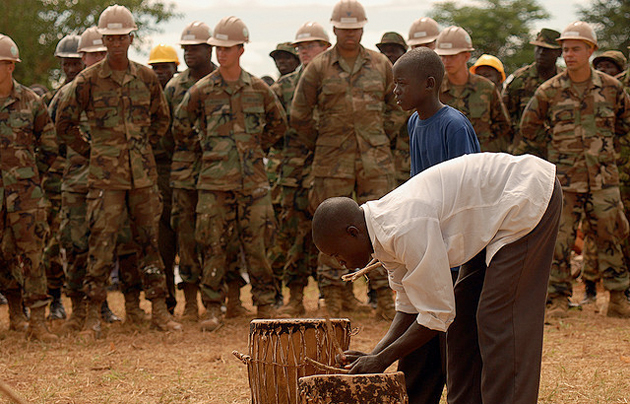
<a href="http://www.flickr.com/photos/usnavy/7609576764/sizes/z/in/photolist-cAr54o-9d4jqM-9p6rpx-9d7sd9-9MtsaM-cE1vYQ-dtLBuZ-fp5DTH-9d4kqX-cWCRQu-cWCRLY-cuxJpC-BUEZx-ciAAMJ-3Vy7Qr-5mQKF5-ayDHBs-5op3B5-9MJxFo-czkumE-bGYH6t-9tHxbZ-674PFz-aRppdV-bjk9qp-bjk9u4-9rMf9R-aPdV2i-aaaDPa-aadt1W-9rMf7V-9rQdwj-8NZxAT-3pgsgU-9LgcQ2-9MqS6y-eyBwJX-dg64yn-dg66f1-e7XoLJ-e7XojE-dg66pu-dg64J6-5DAUfR-9QWz8Z-9qy6cz-aLZNak-6Tev8K-fWjdJ8-8og7b-bc8fwr/">Official U.S. Navy Imagery</a>/Flickr
This story first appeared on the TomDispatch website. In the sequester and government-shutdown era, the classic military newspaper Stars and Stripes is facing some of the problems of its civilian brethren and so downsizing its print edition. Among the features to go: Dear Abby. As it happens, TomDispatch is ready to step into the breach. We’ve called on an old and knowledgeable friend, Colonel Manners (ret.), whose experience in military and surveillance matters is evident from his impressive CV (unfortunately, a classified document). His assignment: to answer letters from Americans puzzled by the etiquette, manners, and language of the arcane national security world of Washington. Here is a first sampling from a column that, in syndication, could go global.
I’m an embattled newspaper editor. Recently, I read a New Yorker piece by Ken Auletta that included this disturbing passage about the New York Times: “In early August, the Times was working on a story about an intercepted terror threat when James R. Clapper, the administration’s director of intelligence, asked the paper’s Washington bureau to withhold certain details. Clapper warned that, if the full version were made public, the Times ‘would have blood on our hands.'” The Times withheld those details. However, with so many classified documents pouring out of Washington and the possibility that some might come into the possession of my paper, I worry about finding blood on my hands, too. On a personal note, I’m extremely squeamish. In college, I had to leave my biology class when the professor showed a film on Harvey’s discovery of the circulatory system. While watching Grey’s Anatomy, I have to close my eyes whenever surgery comes on screen. I grow faint if I get a paper cut. Any suggestions?
Stressed and Bloody Anxious in Chicago
Dear Stressed and Bloody Anxious,
I see your problem. Fortunately, I can assure you that it’s all in your head. To understand why, you need to grasp a distinction that’s clear in Washington, but might be less so in Chicago. When a government official suggests that an outsider might have “blood” on his or her hands—as happened repeatedly, for instance, during the Bradley Manning imbroglio—they are talking about prospective blood, future blood. Negative reactions to blood, according to scientific studies, are due, in part, to its alarming red color. Future blood, being metaphorical, is not red. If it gets on your hands, you will not actually “see” it.
In Washington, this is similarly true of past blood. Take National Intelligence Director Clapper. From 2001-2006, he was the director of the National Geospatial-Intelligence Agency, then undersecretary of defense for intelligence, before being nominated in the Obama years to head the office of national intelligence. In other words, he has served in Washington throughout the Iraq and Afghan Wars, as well as the Global War on Terror. Like many Washington officials, military and civilian, who supported the American global mission in those years, he might be said to have some responsibility for any number of deaths and so to have “blood on his hands.” Think of the almost 4,500 Americans who died in Iraq or the nearly 2,300 who have, thus far, died in Afghanistan, or the tens of thousands of Iraqis and Afghans who died in those years.
Now, here’s the point: Washington is not disturbed by such blood. The reason is simple. It, too, can’t be seen. I’ve met Clapper and I can assure you that, when he shakes your hand, there is not the slightest trace of a reddish tint anywhere on it. (He’s got an impressively firm grip, by the way!) This, I hope, will lighten your unnecessarily grim mood. Like so many other stalwarts in our national security universe, Clapper is a model. He is unfazed, and his “blood” is far more real than the highly speculative and metaphorical blood that might someday be on your hands for a killing related to the release of a classified document. Note that, despite the appearance of startling numbers of such documents in recent years, there is no record of prospective blood actually being spilled.
Yours truly,
Col. Manners (ret.)
***
Dear Col. Manners,
As the owner of a furniture store in Kalamazoo, Michigan, I’ve been worried about our competitors, especially IKEA, getting a step on us. So here’s what I want to know: recently, speaking of Iran, President Obama said that he was keeping “all options on the table,” adding that “we will do anything to make sure Iran doesn’t get a nuclear weapon.” I’ve noticed that this phrase has, since 9/11, grown ever more popular in Washington. I was wondering about that table everyone is talking about. Given that it seems to be reserved for major weapons systems of various sorts and nothing else (at least nothing else is ever mentioned), who manufactures such a table? Can I order it somewhere? Does it really exist or is it just an image meant to stand in for a future military assault on Iran (or wherever)? Would it be too big to fit in my store? I’m most appreciative for any information you could give me on the subject.
Tabled in Kalamazoo
Dear Tabled in Kalamazoo,
That table is quite real. I saw one once. I obviously can’t say where, though it held a set of bunker-busting missiles. I should add that it is not a table in the normal sense—i.e., one of those four-legged, flat-topped structures we tend to place in our dining rooms or kitchens. Again, I can say no more. Rest assured, however, that when the president says “all options are on the table,” he means it. And you are quite accurate in pointing out that on such tables “all” the options are indeed military. Though always referred to in the singular, in reality, there are a number of such tables for each country mentioned; the Syrian ones, for example, hold Tomahawk missiles and B-2 bombers; the Iranian ones, those bunker-busters, among other major weapons systems.
I don’t know if you noticed, but on the night before the recent government shutdown, the Pentagon went on a buying spree, dumping $5 billion into the accounts of major weapons makers (and others). According to someone I trust in Washington, the intelligence community similarly dipped into its black budget accounts and bought a number of things, including at least three back-up “option tables” at a cost of millions of dollars. (Again, I can’t tell you exactly how much.) Unfortunately, you cannot purchase such products for your store. The good news is that neither can IKEA.
Sincerely,
Col. Manners (ret.)
Dear Col. Manners,
I have to ask for your discretion, for reasons that will quickly become apparent. There are 12 documented cases in which a National Security Agency employee used NSA surveillance programs to hack into a partner’s, lover’s, or romantic interest’s email or listen in on his or her phone calls. And this is generally considered just “the tip of the iceberg.” I am a civilian employee of the NSA. Consider me the unlucky thirteenth case. I know that such acts are sardonically known as LoveINT, but in my case that wasn’t it. As I’ve told my former partner, I just wanted to know if she and a friend of ours were planning a surprise birthday party for me. (I’m one of those people who doesn’t like to be caught off-guard.)
The Agency took no action against me, but my partner has never forgiven me. (She’s now living with our former mutual friend.) She still insists that I should apologize. I consider this irrational. I say that no harm was done. I’ve pointed out to her that the NSA hacked into the emails and phone calls of Dilma Rousseff, the Brazilian president, and the president of the United States has refused to apologize. His only response was to launch a many months-long “broad review” of NSA practices. (Believe me, there’s nothing to investigate. We did it.) As far as I can see, there’s an equivalency in the two cases: like my partner, Rousseff responded in an overly emotional way, calling off a long planned trip to Washington and later denouncing the US at the United Nations. Here’s my question: if the president doesn’t have to apologize, why should I? Who’s in the right here? Please settle this dispute for me.
Unlucky 13
Dear Unlucky 13,
I’m afraid that the rules of etiquette are different in the two cases you cite. While I regret to tell you this, you are in the wrong and should apologize. In our personal lives, it is important to say we’re sorry to those we treat badly, and hacking into your partner’s email is, by definition, bad manners.
 Similarly, on a global scale, if, say, the Argentinean government had hacked into President Rousseff’s email, an apology would indeed be in order. It’s clearly not a good neighborly thing to do. But I hardly need to add the obvious: the United States is not a normal nation. It’s the planet’s sole superpower. It goes by a different rulebook, which it writes itself, and that is as it should be. So if we Americans have been playing by house rules in the case of the NSA and Rousseff, then what is there to apologize for?
Similarly, on a global scale, if, say, the Argentinean government had hacked into President Rousseff’s email, an apology would indeed be in order. It’s clearly not a good neighborly thing to do. But I hardly need to add the obvious: the United States is not a normal nation. It’s the planet’s sole superpower. It goes by a different rulebook, which it writes itself, and that is as it should be. So if we Americans have been playing by house rules in the case of the NSA and Rousseff, then what is there to apologize for?
It’s common knowledge that an American president does not apologize for the acts of his hackers or his soldiers or his spies or his officials or his drones. In addition, it’s obvious that such an apology would be impractical and set this country on the road to hell. After all, once a president stopped playing by the superpower rulebook and started apologizing, just consider the Pandora’s box he would open (without a hint of hope at the bottom). If we were a normal nation, there would be a vast list of things he would have to apologize for, including, just in the last decade, kidnappings, torture, abuse, murder, imprisonment in black sites, assassination, and so on and so forth.
So, Unlucky 13, swallow your bad luck and say you’re sorry, but don’t ask the president to do the same.
Confidentially yours,
Col. Manners (ret.)
***
Dear Col. Manners,
I’m a housewife in Tulsa and I had a question for you about the president’s plan for a Syrian intervention. I know that, in the end, it didn’t happen, and I hope you won’t think it’s frivolous of me to bring it up a month later, but I simply couldn’t get it out of my mind. Here’s what I’ve been wondering about: Why is it called “humanitarian intervention” when the president’s (and Pentagon’s) plan, as best I understood it, was to loose Tomahawk missiles and bombers on Damascus? I don’t see anything “human” or “humanitarian” in that. And here’s another related question: why are such strikes always referred to as “surgical” and “precise” when, as far as I can tell, they invariably kill civilians?
Oklahoma Gal
Dear Oklahoma Gal,
Nothing frivolous about your thinking! Let me start with that “surgically precise.” The answer is: American weapons makers are the best in the world and so all of our latest weapons are indeed surgical and precise in their impact. Keep in mind, however, that, as studies have shown, “surgically precise” is a term with significant latitude. Consider, for instance, that, according to a report published in the Archives of Surgery, in a six-and-a-half-year period, Colorado doctors operated on the wrong patient at least 25 times, and another 107 times on the wrong body part. So, surgically precise—yes, indeed!
As for that term “humanitarian intervention,” as you probably know, the Supreme Court long ago turned the corporation into a “person” for matters of law. The Pentagon has functionally done the same thing for weapons like the Tomahawk missile for matters of war. That transformation may not have the force of law, but it does have force, so to speak. Because the Tomahawk is an American missile (produced by the Raytheon corporation, a genuine American outfit), and because, by definition, what we Americans do always comes from the best of intentions and an essential goodness of heart, because, that is, we are as exceptional, as one of a kind, in war as in peace, a missile attack on Syria (or elsewhere) would, by definition, be both “human” and “humanitarian”—and to complete the phrase in question, no one could deny that, had it happened, it would also have been an “intervention.” After all, Washington’s record on interventions speaks for itself. No country in memory has been as prolific an interventionist as the USA.—and it’s a record, like all records, worth taking some pride in.
Yours definitionally,
Col. Manners (ret.)
Tom Engelhardt, co-founder of the American Empire Project and author of The United States of Fear as well as a history of the Cold War, The End of Victory Culture (now also in a Kindle edition), runs the Nation Institute’s TomDispatch.com. His latest book, co-authored with Nick Turse, is Terminator Planet: The First History of Drone Warfare, 2001-2050.
Follow TomDispatch on Twitter and join us on Facebook or Tumblr. Check out the newest Dispatch book, Nick Turse’s The Changing Face of Empire: Special Ops, Drones, Proxy Fighters, Secret Bases, and Cyberwarfare. To stay on top of important articles like these, sign up to receive the latest updates from TomDispatch.com here.








